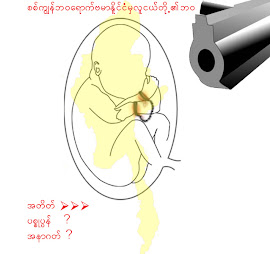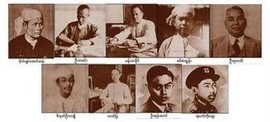အရိုးတြန္ျခင္း
ကၽြန္ေတာ္တို႔ ျမန္မာႏိုင္ငံေတာ္၏ အာဏာကို ၾကားျဖတ္လုယူထားေသာ အာဏာရႈး သန္းေရႊအား တရားဥပေဒအတိုင္း အျပစ္ေပးႏိုင္ရန္မွာ ျမန္မာ ျပည္သား အားလံုး၏ အမ်ိဳးသားေရး တာဝန္ျဖစ္လို႔ ေနၿပီျဖစ္သည္။
ကၽြန္ေတာ္ ဒီေနရာမွာ ျမန္မာျပည္သူမ်ား လုပ္ႏိုင္ေသာ အလုပ္တစ္ခုကို ျမင္ေတြ႔မိပါသည္။ လုပ္ၾကပါရန္လည္း တိုက္တြန္းလိုပါသည္။ လုပ္ရမည့္ ကိစၥမွာ ..
အထက္ပါ ဦးေအာင္လင္းထြတ္ သက္ေသ အျဖစ္ရွိေသာ အမႈတြင္ ျမန္မာႏိုင္ငံသားမ်ားသာ မက၊ အျပစ္မဲ့ေသာ ထိုင္းလူမ်ိဳးမ်ားကုိပါ သတ္ျဖတ္ေသာ အမႈ ျဖစ္ေနပါသည္။ ထို အမႈတြင္ ေသသြားေသာ ထိုင္းလူမ်ိဳးမ်ား၏ မိသားစုမ်ား၊ ထိုင္းအာဏာပိုင္မ်ားက လက္ခံႏိုင္မည့္ ကိစၥ တစ္ခု မဟုတ္ေပ။
ထိုေၾကာင့္ အဆိုပါ သတင္းႏွင့္ အသံဖိုင္ကို သာမန္ ထိုင္းျပည္သူမ်ား၊ ထိုင္းအာဏာပိုင္မ်ားႏွင့္ ထိုင္းသတင္းဌာနမ်ားသို႔ ျမန္မာလူမ်ိဳးတိုင္း အမ်ိဳးသားေရး တာဝန္အျဖစ္ တာဝန္ယူ သတင္းေပးပို႔ အသိေပးျခင္းျဖင့္ သန္းေရႊ၏ ရက္စက္စြာ က်ဴးလြန္ေသာ လူသတ္မႈအား ေဖာ္ထုတ္ၾကပါရန္ တိုက္တြန္းႏိႈးေဆာ္လိုက္ပါသည္။
အဂၤလိပ္လို သတင္း မူရင္း လင့္မွာ
http://www.timesonline.co.uk/tol/news/world/asia/article4083370.ece
ျမန္မာလို အသံကို ဒီေနရာတြင္ ရယူနားဆင္ႏိုင္ပါသည္။
အင္တာဗ်ဳးေသာ ေန႔မွာ ၂၅ ရက္ ေမလ ၂၀၀၈ ျဖစ္ပါသည္။
Burma: Than Shwe 'ordered troops to execute villagers'
The leader of the Burmese junta, Than Shwe, personally ordered the murder of scores of unarmed villagers and Thai fishermen, according to a senior diplomat and military intelligence officer who defected to America.
Aung Lin Htut, formerly the deputy chief of mission at the Burmese Embassy in Washington, described to a radio station how 81 people, including women and children, were shot and buried on an isolated island after straying into a remote military zone in the southeast of the country in 1998.
After one general hesitated to kill the civilians, fearing that the commander who had given the order was drunk, he was informed that it came from “Aba Gyi” or “Great Father” – the term used to refer to Senior General Than Shwe, the head of the junta.
A few days later troops from the same military base captured a Thai fishing boat that had strayed close to Christie Island in the Mergui Archipelago. The 22 fishermen on board were also shot and buried on the island. “I was a witness to the two incidents in which a total of about 81 people were killed,” Mr Aung Lin Htut, formerly a major in military intelligence, told the Burmese language service of Voice of America. “All of them were unarmed civilians.” In 46 years of military rule in Burma, there have been numerous reports of grave human rights violations but few have been attested by so well placed a source as Mr Aung Lin Htut. They come at a time when General Than Shwe and his regime are coming under scrutiny, after their refusal to allow a full scale relief operation for the victims of Cyclone Nargis.
The French Government has said that it comes close to being a “crime against humanity”, and last week Robert Gates, the US Defence Secretary, called it “criminal neglect”. If a tribunal like the ones established for Rwanda and the former Yugoslavia is ever created for Burma, then Mr Aung Lin Htut will doubtless be called to give evidence.
He sought asylum in the US in 2005, along with six members of his family, after a purge against the country’s prime minister and intelligence chief of the time by General Than Shwe destroyed the careers of a generation of intelligence officers. Given the control of information in Burma, his account is impossible to verify. But it has credibility because it is the first time since his defection that Mr Aung Lin Htut has made any public comment on his former masters.
In May 1998 he was stationed on Zadetkyi island, a frontline base close to Burma’s maritime border with Thailand. The commander of the base was Colonel Zaw Min, who is now Minister for Electric Power and general secretary of the Union Solidarity and Development Association, the junta’s grassroots organisation.
A unit led by the colonel landed on Christie Island and found 59 people living there to gather wood and bamboo, in violation of Burmese law. The order came back from headquarters that they were to be “eliminated”.
Myint Swe, an air force general, said that he was a religious person, and that the matter should be handled delicately. He said that he was very concerned by the timing of the elimination order – just after lunch, a time when General Maung Aye, now the number two in the junta, was usually drunk.













No comments:
Post a Comment